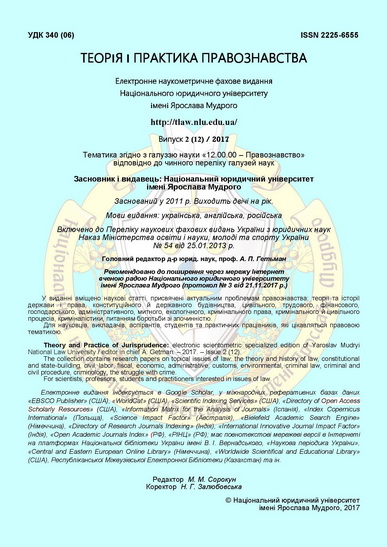About definition of the term «Customs disputes»
DOI:
https://doi.org/10.21564/2225-6555.2017.12.110563Keywords:
customs disputes, customs relationship, state customsAbstract
The article is devoted to the essential features and forming a customs dispute the definition of «customs dispute.» This makes it possible to determine the range of legal disputes, which are set by customs and types of legal disputes directly or indirectly related to the implementation of the state customs but does not belong to the customs disputes.
The customs disputes are closely related to administrative disputes. The legal conflict between a natural or legal person, on the one hand, and the subject of power authority, on the other, is conditioned by the latter's management functions, which can be resolved both in judicial and extrajudicial (administrative) order [6, p. 24]. In our opinion, it can be argued that customs disputes can be resolved both in judicial and extrajudicial (administrative) order. And, speaking of the judicial procedure for resolving customs disputes, we mean the decision of them in the order of administrative proceedings. A direct confirmation of this is a generalization of the practice of the application by the administrative courts of the provisions of the Customs Code of Ukraine in the version of 13.03.2012, recommended in 2017 by the Plenum of the Supreme Administrative Court of Ukraine to judges of administrative courts to take into account when considering cases [7]. This is due to the fact that, as was established above, the obligatory party to customs disputes are the bodies of the State Fiscal Service of Ukraine or their officials authorized to carry out state customs business. In any case, these subjects are the bearers of power and customs disputes (taking into account the statistical data given in this generalization of judicial practice) are usually associated with improper implementation of such power authority.
References
Tamozhennoe pravo. V.G. Draganova, M.M. Rassolova (Eds.). (2001). Moscow: JUNITI-DANA [in Russian].
Mytne pravo Ukrainy. V.V. Chentsova, D.V. Pryimachenka (Eds.). (2008). Kyiv: Istyna [in Ukrainian].
Mytnyi kodeks Ukrainy vid 13.03.2012 r. (2012). Vidomosti Verkhovnoi Rady Ukrainy, 44–45, 46–47, 48, art. 552.
Pro utvorennia Derzhavnoi fiskalnoi sluzhby: Postanova Kabinetu Ministriv Ukrainy vid 21.05.2014 r. № 160. (2014). URL: http://zakon3.rada.gov.ua/laws/show/160-2014-n.
Bakunin, M.A. (2000). Anarhija i porjadok: sochinenija. Moskva: JeKSIMO-Press [in Russian].
Pysarenko, N.B., Somina, V.A. (2012). Administratyvno-pravovi spory (udoskonalennia poriadku vyrishennia). Kharkiv: Pravo [in Ukrainian].
Pro Dovidku shchodo uzahalnennia praktyky zastosuvannia administratyvnymy sudamy polozhen Mytnoho kodeksu Ukrainy v redaktsii vid 13 bereznia 2012 roku: Postanova Plenumu Vyshchoho administratyvnoho sudu Ukrainy vid 23.03.2017 r. № 2. (2017). URL: http://vasu.gov.ua/plenum/post_plenum/ postanova_plenumu_2_13- 03-2017.
Nikanorova, O.V. (2014). Mytni pravovidnosyny yak riznovyd mytnykh pravovykh vidnosyn v Ukraini. Mytna sprava, 6 (96), part 2, book 2, 463–469 [in Ukrainian].
Downloads
Published
How to Cite
Issue
Section
License
Copyright (c) 2017 Theory and practice of jurisprudence

This work is licensed under a Creative Commons Attribution 4.0 International License.




